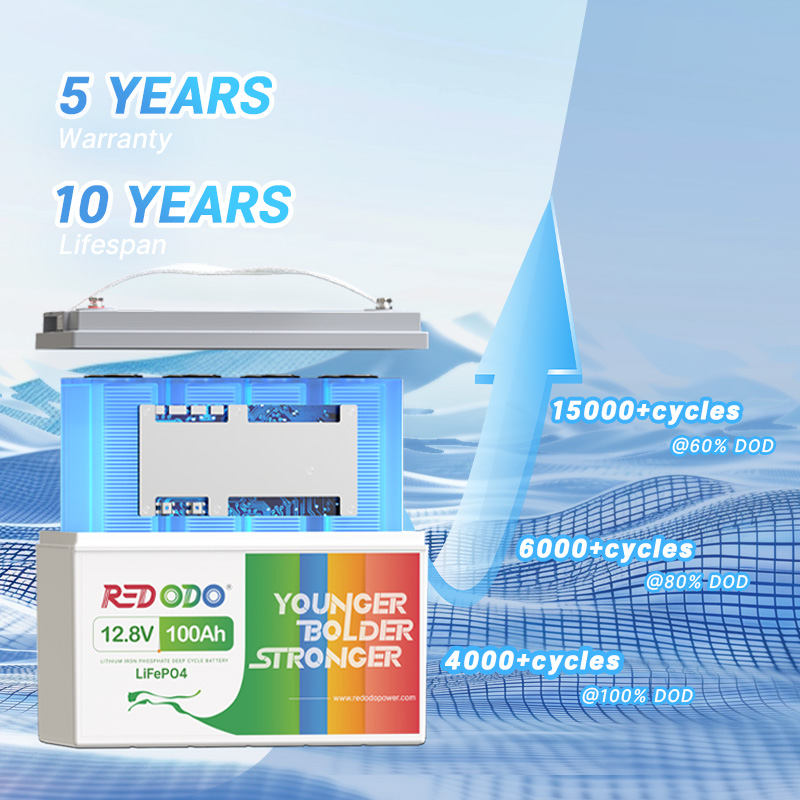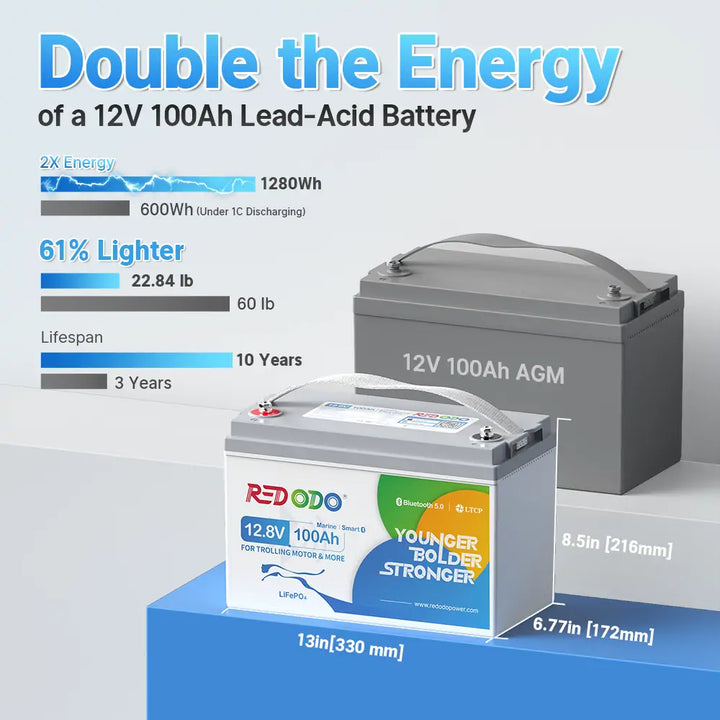Camping enthusiasts are constantly seeking reliable and efficient power sources to enhance their outdoor adventures. One solution that has gained significant popularity is the use of LifePO4 batteries. In this article, we will explore the many benefits of LifePO4 batteries for camping and discuss their various applications. We will also provide guidance on how to choose the ideal LifePO4 battery for your camping needs.
What are LiFePO4 Batteries?
LifePO4 batteries, also known as lithium iron phosphate batteries, are a type of rechargeable battery that utilizes a lithium-ion technology with an iron phosphate cathode. This chemistry offers several advantages over other battery types.
LiFePO4 batteries operate by storing electrical energy within their cells for later use in powering devices or appliances. Each battery cell contains a cathode (positive electrode), an anode (negative electrode), and an electrolyte solution that permits the flow of ions between the cathode and anode.

During the charging process, lithium ions migrate from the cathode to the anode, where they are stored. Subsequently, during discharge, these ions return to the cathode, releasing their energy to supply power to devices or appliances.
8 Benefits When Using LiFePO4 Batteries for Camping
- Lightweight: LifePO4 batteries are significantly lighter than traditional lead-acid batteries. For instance, a 100Ah lead-acid battery can weigh around 30-60 lbs, while a 100Ah LifePO4 battery weighs only about 22-26 lbs. This reduction in weight makes LifePO4 batteries much easier to transport and carry during camping trips, especially for backpackers and those who need to manage their gear efficiently.
- High Energy Density: LifePO4 batteries have a high energy density, meaning they can store more energy in a smaller and more compact form factor. On average, LifePO4 batteries have an energy density of about 130-170 Wh/kg, compared to lead-acid batteries that have an energy density of around 30-40 Wh/kg. This higher energy density allows campers to power their devices and equipment efficiently without taking up much space.Lead-acid batteries have a limited cycle life, and the best way to protect them is to not discharge them below half of their total storage ampere-hours. Lifecycle data is given for a 50% depth of discharge (DOD). Therefore, in reality, a 100Ah battery should be considered as a 50Ah battery. Lead-acid batteries are manufactured based on price, and the cheaper the battery, the shorter its lifespan and cycle life.

- Long Cycle Life: LifePO4 batteries typically have a longer cycle life compared to other battery types. They can withstand a higher number of charge-discharge cycles before their capacity significantly degrades. On average, LifePO4 batteries can handle around 2000-5000 cycles, while lead-acid batteries typically last for 300-800 cycles. This long cycle life makes LifePO4 batteries more durable and reliable for frequent camping trips and extended outdoor use.
- Fast Charging: LifePO4 batteries have a faster charging capability compared to other battery chemistries. They can be charged at higher currents and absorb charge more efficiently, resulting in shorter charging times. For example, a 100Ah LifePO4 battery can be charged at rates of 0.5C to 1C, meaning it can be charged at 50-100A, allowing campers to quickly recharge their batteries and get back to their adventures without waiting for extended periods.
- Consistent Voltage Output: LifePO4 batteries maintain a stable voltage output throughout their discharge cycle. Unlike lead-acid batteries that experience voltage drops as they discharge, LifePO4 batteries provide a steady and reliable power source for camping equipment and devices. This is particularly useful for sensitive electronic devices that may be adversely affected by voltage fluctuations.
- Safety: LifePO4 batteries are considered safer than some other lithium-ion battery chemistries. Unlike lithium-ion batteries that use cobalt-based cathodes, LifePO4 batteries have a lower risk of thermal runaway or catching fire. They are more stable and less prone to overheating, which is especially important for camping where resources and immediate assistance may be limited.
- Low Self-Discharge Rate: LifePO4 batteries have a lower self-discharge rate compared to other rechargeable batteries. They can retain their charge for a more extended period when not in use, typically losing only about 2-3% of their charge per month. This is ideal for campers who might not use their batteries regularly and want them to be ready for the next trip without needing frequent recharging.
- Eco-Friendly: LifePO4 batteries are considered more environmentally friendly than traditional lead-acid batteries. They contain no toxic heavy metals such as lead or cadmium, making them less harmful to the environment. Additionally, their long lifespan and recyclability contribute to reducing electronic waste and promoting sustainable energy storage solutions.
Overall, using LifePO4 batteries while camping can enhance the camping experience by providing a reliable and efficient power source that is lightweight, durable, safe, and eco-friendly. However, as with any battery, it's essential to follow proper charging and storage guidelines to maximize their benefits and lifespan.
Things to Notice When Choosing a LiFePO4 Battery
When choosing a LifePO4 battery for camping, there are a few factors to consider.
1. Battery Capacity
First, determine the capacity of the battery you need based on the devices you will be powering. It's important to choose a battery with enough capacity to last throughout your camping trip without needing frequent recharging.
2. Battery Size and Weight
Consider the weight and size of the battery. If you are backpacking or have limited space, a lightweight and compact battery will be more convenient. LifePO4 batteries are known for their lightweight design, making them ideal for campers who need to carry their equipment for long distances.
3. Voltage System
Pay attention to the voltage output and compatibility of the battery. Ensure that the battery you choose can provide the proper voltage for your camping devices and appliances. Some LifePO4 batteries come with multiple output options, allowing you to power various devices simultaneously.
Read More: 12V vs. 24V: Which RV Battery System is Better?
4. Battery Brand
Consider the overall quality and reputation of the battery brand like Redodo. Read reviews and do some research to ensure that you are investing in a high-quality battery that will perform well and last for a long time.
Conclusion
In conclusion, LifePO4 batteries are the best choice for camping due to their lightweight design, high energy density, long cycle life, fast charging capabilities, consistent voltage output, safety, low self-discharge rate, and eco-friendliness. By investing in a reliable LifePO4 battery, camping enthusiasts can enjoy a more comfortable and convenient outdoor experience.

Redodo

Redodo
Recent Post

How Long Does a Trolling Motor Battery Last?

Convert RV from Lead-Acid to Lithium Battery: A Complete Guide

How Long Will a 200Ah Battery Run an Air Conditioner?

A Full Review of Redodo 12V 140Ah Group 31 Deep Cycle Battery

![⚡[$220 after Sign-Up] Redodo 12V 100Ah LiFePO4 Lithium Battery | Best Budget | For RV, Solar, Trolling Motor](http://www.redodopower.com/cdn/shop/files/Redodo_12v_100ah_lithium_battery_b9015ddd-64b5-4be2-8c88-392f0bb4ab30.jpg?v=1742973160)
![⚡[$220 after Sign-Up] Redodo 12V 100Ah Group 24 Deep Cycle LiFePO4 Lithium Battery | For Home, RV, Marine](http://www.redodopower.com/cdn/shop/files/Redodo_12V_100Ah_group_24_lithium_battery_6301965d-f6e8-467f-825f-3eec839b3e1f.jpg?v=1744105344)
![⚡[$220 after Sign-Up] Redodo 12V 100Ah Lithium Trolling Motor Battery With Low Temp Protection](http://www.redodopower.com/cdn/shop/files/Redodo12V100Ahlow-tempbattery.webp?v=1738462317)
![⚡[$239 after Sign-Up] Redodo 12V 100Ah Group 24 Bluetooth LiFePO4 Battery | Real-Time Battery Monitoring | For RV, Marine, Solar](http://www.redodopower.com/cdn/shop/files/Redodo_12V_100Ah_group_24_bluetooth_lithium_battery.jpg?v=1744253032)
![⚡[$220 after Sign-Up] Redodo 12V 100Ah Group 31 Bluetooth Lithium Battery | Real-Time Battery Monitoring | For RV, Marine, Solar](http://www.redodopower.com/cdn/shop/files/redodo_12v_100ah_bluetooth.webp?v=1744698930)
![⚡[$220 after Sign-Up] Redodo 12V 100Ah Mini Lithium LiFePO4 Battery | Smallest Battery | For RV, Trolling Motor, Solar](http://www.redodopower.com/cdn/shop/files/Redodo12V100AhMiniLiFePO4LithiumBattery.jpg?v=1739959054)

![⚡[$377 after Sign-Up] Redodo 12V 200Ah Lithium LiFePO4 Battery | 1280W Load Power | For RV, Solar, Off-Grid](http://www.redodopower.com/cdn/shop/files/Redodo12V200ahlithiumbattery.jpg?v=1735892910)

![⚡[$524 after Sign-Up] Redodo 12V 300Ah Lithium LiFePO4 Battery | Replaces 6*12V 100Ah AGM Batteries | RV, Marine, Solar](http://www.redodopower.com/cdn/shop/files/Redodo_12V_300ah_lithium_deep_cycle_battery.png?v=1744797523)